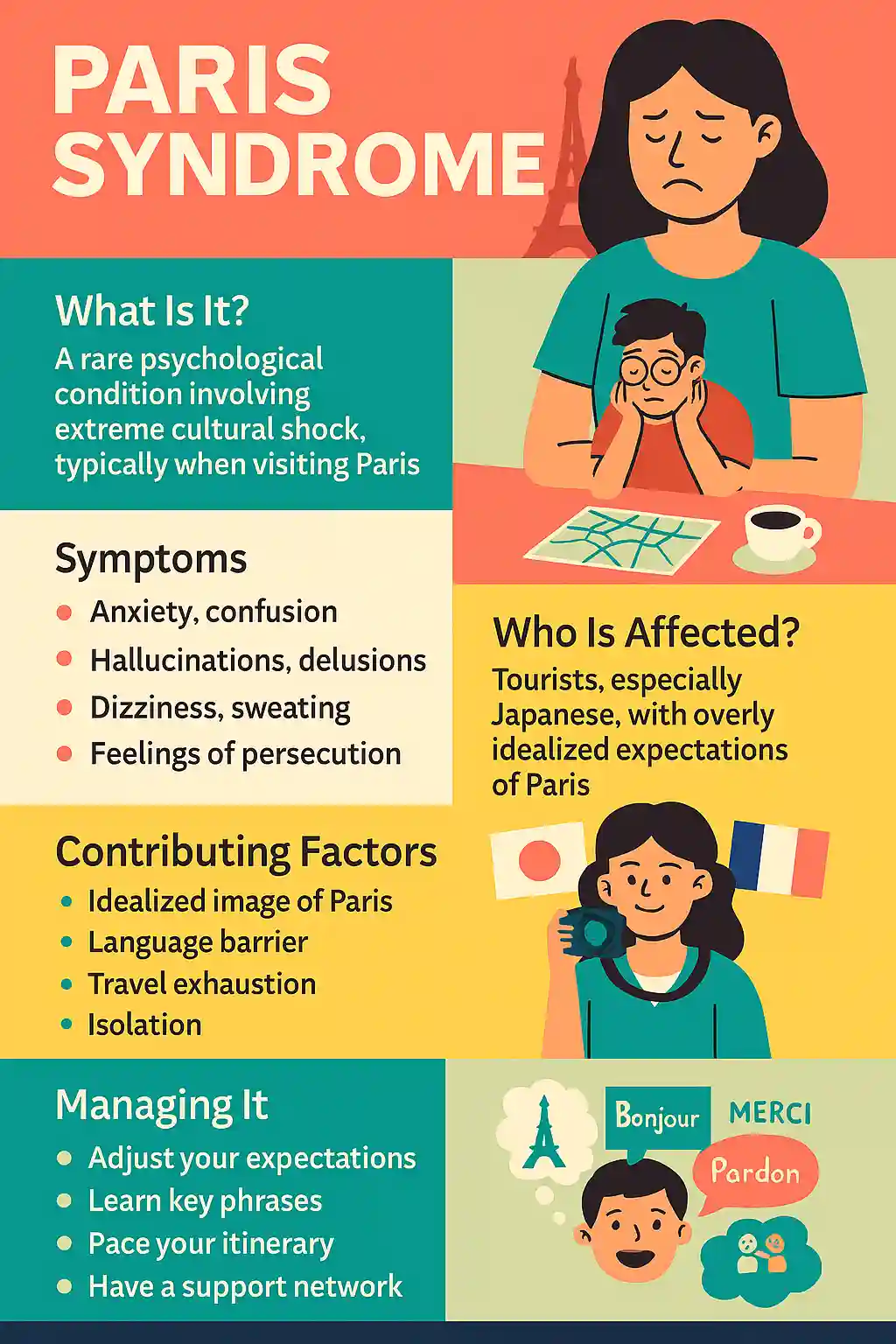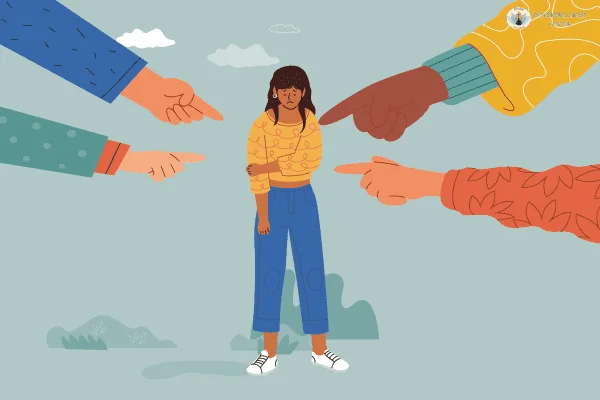
We often dream of travel as an escape into beauty, elegance, and adventure—especially when it comes to cities like Paris. The Eiffel Tower at sunset, charming cafés on cobblestone streets, and the refined style of Parisians have long fueled the world’s romantic imagination. But for a small number of travelers, arriving in the City of Light leads not to joy but to emotional collapse. This rare and curious reaction is known as Paris Syndrome—a psychological condition triggered by a profound clash between fantasy and reality.
What Is Paris Syndrome?
Paris Syndrome is a rare and acute form of culture shock, typically experienced by first-time visitors to Paris who arrive with highly romanticized expectations. When the real city—often busy, blunt, noisy, and urban—fails to match that dream, it can trigger intense psychological and even physical symptoms.
These symptoms may include:
-
Panic attacks or severe anxiety
-
Hallucinations or feelings of detachment from reality
-
Rapid heartbeat, dizziness, or nausea
-
Feelings of persecution or hostility from locals
-
A deep sense of disappointment or sadness
While the syndrome is most often reported among Japanese tourists, it has also affected individuals from other parts of Asia and, in rarer cases, Western travelers.
Where the Term Came From
The term Paris Syndrome was coined in the 1980s by Hiroaki Ota, a Japanese psychiatrist working in France. He noticed that some Japanese visitors experienced extreme psychological distress during their stay in Paris—even needing hospitalization or early repatriation. Ota connected this with unmet cultural expectations and a deep internal dissonance between the imagined city and the lived experience.
Although only around 20 documented cases are reported each year, the phenomenon has persisted for decades, especially among visitors who idealize Paris through media, literature, and advertising.
Why Paris? The Power of Cultural Mythmaking
Not every city becomes the subject of an emotional breakdown. So why Paris?
The answer lies in how the city has been mythologized across the world. For generations, Paris has been portrayed as a flawless realm of beauty, love, fashion, and art. Films, luxury brands, perfume ads, and romantic novels all feed into this pristine narrative. Visitors may expect warmth, elegance, and old-world charm—only to be greeted by indifferent service, crowded metros, and the realities of modern urban life.
This mental gap between expectation and reality is at the heart of Paris Syndrome.
A Perfect Storm: The Psychological Triggers
Several contributing factors make some people more vulnerable to Paris Syndrome, especially when traveling far from home for the first time.
1. Idealization and Unrealistic Expectations
Travel marketing and social media portray Paris as a dream world. For individuals who’ve saved for years and built the city up in their mind, the contrast can be emotionally devastating.
2. Cultural and Language Barriers
Miscommunication is common. French locals may not always be welcoming or fluent in English. For travelers from cultures where politeness and indirect communication are central (like Japan), Paris can feel abrasive or cold.
3. Physical Exhaustion
Travel is tiring. Add jet lag, long flights, time zone changes, and a packed sightseeing schedule, and emotional resilience drops. Fatigue becomes fertile ground for emotional spirals.
4. Emotional Isolation
Solo travelers—especially those who feel out of place or homesick—can quickly descend into loneliness. If the environment feels unwelcoming, that sense of isolation can escalate fast.
5. Disillusionment with Reality
Rude staff, graffiti, noise, litter, or poor weather may seem trivial. But when expectations are sky-high, even small disappointments can feel overwhelming.
Real Cases and What Happens
Though rare, Paris Syndrome cases can be dramatic. Japanese embassies in France have occasionally intervened to assist citizens experiencing acute symptoms—some even requiring immediate flights home and psychiatric care.
In one reported case, a woman was hospitalized after believing Paris shop owners were out to hurt her. In another, a traveler insisted they were someone else entirely after just three days in the city. While extreme, these stories reflect the genuine mental strain that can occur when our internal world crashes against reality.
Is It a Mental Illness?
No—Paris Syndrome is not classified as a formal psychiatric disorder like anxiety or depression. Instead, it is considered a transient, situational condition: a severe reaction to unexpected cultural stressors. Most people recover fully once they leave the environment and return to familiar surroundings.
However, it does offer important insights into how deeply cultural identity, expectation, and stress can intertwine—especially in unfamiliar settings.
How Paris Syndrome Connects to Delayed Gratification
Interestingly, the emotional impact of Paris Syndrome aligns with other psychological research into patience and expectation. For example, the famous Stanford Marshmallow Experiment explored how children handled delayed rewards, finding that those who could wait tended to achieve better life outcomes.
In some ways, Paris Syndrome is a reverse scenario: instead of delaying gratification, individuals finally get what they’ve waited for—only to discover it doesn’t match what they imagined. The emotional crash speaks to the same underlying psychological forces: anticipation, projection, and reward.
How to Prevent or Manage Paris Syndrome
While most people won’t experience Paris Syndrome, managing your mindset while traveling can reduce risk and increase enjoyment. Here are a few smart strategies:
1. Temper Your Expectations
Approach travel with curiosity, not certainty. Paris, like any city, is imperfect. The key to enjoying it is letting go of expectations and embracing what is.
2. Do Realistic Research
Beyond glossy travel guides, read blogs or forums where travelers discuss their honest experiences. You’ll get a fuller sense of the city’s rhythm, flaws, and charm.
3. Learn Basic Local Language
A few key phrases in French—“bonjour,” “merci,” “excusez-moi”—can go a long way. Locals often respond better when visitors try to speak the language, even if imperfectly.
4. Plan Breaks into Your Itinerary
Don’t overfill your schedule. Build in time to rest, reflect, or just sit at a park. Slowing down reduces emotional fatigue.
5. Travel with a Companion
Having someone to process the experience with—whether a friend, guide, or fellow traveler—can provide crucial emotional grounding.
The Broader Picture: Emotional Vulnerability in a Globalized World
At its core, Paris Syndrome isn’t really about Paris. It’s about human vulnerability. When reality collides with the stories we’ve believed, and when stressors like language, fatigue, and isolation pile up, even the strongest minds can wobble.
This phenomenon reminds us how important it is to travel with openness rather than fantasy—to experience new places as they are, not just as we wish them to be.
Inbound & Outbound Resources
For deeper psychological insight, read the MaxMag article on The Stanford Marshmallow Experiment, which explores the psychology of delayed reward and expectation—concepts closely linked to the emotional mechanics behind Paris Syndrome.
Additional trusted resources:
-
Cleveland Clinic explains emotional responses to stress and sudden changes in environment.
-
Verywell Mind provides practical tools for handling culture shock and anxiety.
-
National Geographic Travel offers balanced, realistic travel advice grounded in cultural awareness.
Frequently Asked Questions (FAQ)
Q1: Is Paris Syndrome a real condition?
Yes. While rare, it has been observed and documented by medical professionals, particularly among tourists from Japan. It is triggered by cultural shock and unmet expectations.
Q2: What are the symptoms of Paris Syndrome?
Symptoms may include panic, confusion, hallucinations, rapid heartbeat, dizziness, sadness, and intense disappointment.
Q3: Who is most at risk?
First-time visitors to Paris with high expectations, especially solo travelers or those from cultures very different from France, may be more vulnerable.
Q4: How is Paris Syndrome treated?
Treatment usually involves rest, reassurance, and sometimes medical intervention. In extreme cases, people return home for recovery.
Q5: Can it be prevented?
Yes. Managing expectations, doing realistic research, learning some of the local language, and pacing your travel can help prevent it.
Q6: Is Paris Syndrome unique to Paris?
While the term is specific to Paris, similar emotional reactions have been observed in places like Jerusalem or Florence. These responses fall under the broader umbrella of intense culture shock.




